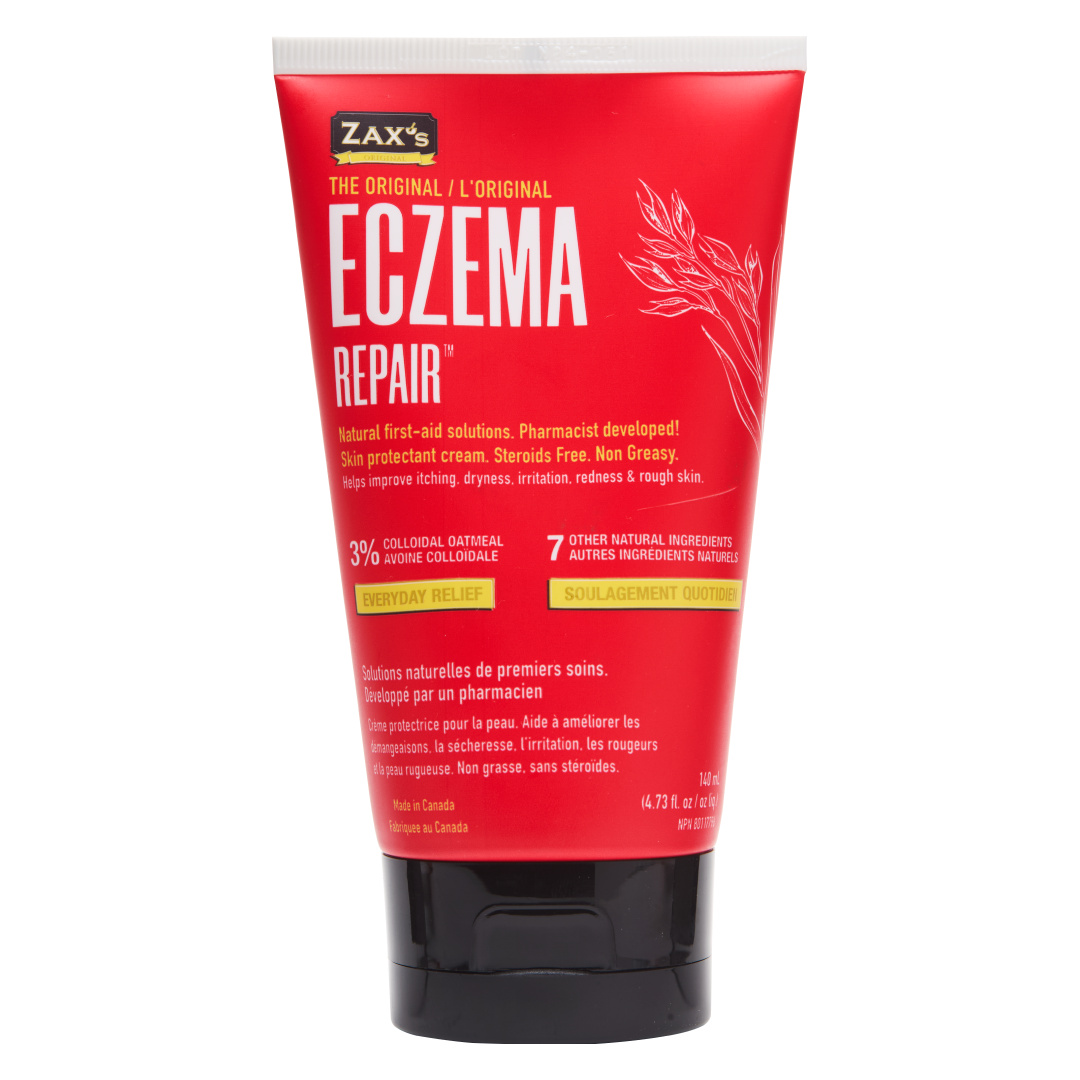Eczema, also known as atopic dermatitis, is a chronic skin condition characterized by itchy, inflamed patches of skin. Managing eczema involves a combination of proper skincare, lifestyle adjustments, and sometimes medication. Here’s an expert’s step-by-step guide to managing eczema effectively:
1. Zax’s Original Eczema Cream
Managing eczema is all about finding a reliable cream that soothes and protects your skin and works for your condition. Our Original Eczema Cream is specially formulated with natural ingredients to provide relief from itching and inflammation.
- Colloidal Oatmeal: Known for its soothing properties, colloidal oatmeal helps relieve itching and moisturize the skin.
- Licorice Extract: This natural anti-inflammatory ingredient helps reduce redness and swelling.
- Calendula: Promotes healing and soothes irritated skin.
To use our Eczema Cream, apply a thin layer to the affected areas twice daily or as needed. The cream helps create a protective barrier on the skin, locking in moisture and preventing further irritation.
2. Moisturize Regularly
Keeping your skin well-moisturized is essential for managing eczema. Moisturizers help maintain the skin’s barrier function and prevent dryness.
- Choose the Right Moisturizer: Look for thick, fragrance-free creams or ointments. Ingredients like ceramides, and shea butter are beneficial for eczema-prone skin.
- Apply After Bathing: The best time to apply moisturizer is immediately after bathing, while your skin is still damp. This helps lock in moisture.
- Moisturize Frequently: Apply moisturizer at least twice a day, and more often if needed. Keeping your skin hydrated can reduce the frequency and severity of flare-ups.
3. Identify and Avoid Triggers
Eczema can be triggered by various factors, including allergens, irritants, and stress. Identifying and avoiding these triggers is crucial for managing the condition. Here are some common triggers and how to avoid them:
- Allergens: Common allergens include dust mites, pet dander, pollen, and certain foods. Keep your home clean, use hypoallergenic bedding, and consider allergy testing to identify specific triggers.
- Irritants: Harsh soaps, detergents, and fragrances can irritate sensitive skin. Use mild, fragrance-free products and wear protective gloves when handling cleaning products.
- Stress: Stress can exacerbate eczema. Practice stress-reducing techniques such as yoga, meditation, and deep breathing exercises.
Keeping a diary of your symptoms and potential triggers can help you identify patterns and avoid flare-ups.
4. Gentle Cleansing
Proper cleansing is essential for managing eczema without causing further irritation. Here’s how to cleanse your skin gently:
- Use Mild Cleansers: Choose fragrance-free, soap-free cleansers that are formulated for sensitive skin. Avoid products with harsh chemicals or alcohol.
- Avoid Hot Water: Hot water can strip the skin of its natural oils, leading to dryness and irritation. Use lukewarm water instead for washing your face, showering or bathing.
- Pat Dry, Don’t Rub: After bathing, gently pat your skin dry with a soft towel. Avoid rubbing, which can aggravate eczema.
Taking short, lukewarm showers or baths and following up with a good moisturizer can help maintain your skin’s health.
5. Avoid Scratching
Scratching can worsen eczema and lead to infection.
- Keep Nails Short: Trim your nails regularly to minimize damage if you do scratch.
- Use Cold Compresses: Applying a cold compress to itchy areas can provide relief and reduce the urge to scratch.
Distraction techniques, such as keeping your hands busy with a stress ball or engaging in activities, can also help you avoid scratching.
6. Use a Humidifier
Dry air can exacerbate eczema symptoms. Using a humidifier adds moisture to the air, which can help keep your skin hydrated.
- Choose the Right Humidifier: Cool-mist humidifiers are generally preferred for eczema. Ensure your humidifier is easy to clean to prevent mold and bacteria growth.
- Maintain Optimal Humidity Levels: Aim for indoor humidity levels between 30% and 50%. Use a hygrometer to monitor the humidity in your home.
- Clean Regularly: Clean your humidifier according to the manufacturer’s instructions to prevent the growth of mold and bacteria.
Running a humidifier, especially during the winter months, can help alleviate dry skin and reduce eczema flare-ups.
7. Consult a Dermatologist
For severe or persistent eczema, it’s important to consult a dermatologist. A dermatologist can provide personalized treatment options, including prescription medications and therapies.
- Topical Steroids: These medications reduce inflammation and are often used during flare-ups. Use them as directed by your dermatologist.
- Calcineurin Inhibitors: These are non-steroidal medications that help reduce inflammation and itching.
- Phototherapy: Controlled exposure to ultraviolet light can help manage severe eczema.
Your dermatologist can help you develop a comprehensive treatment plan tailored to your specific needs.
DIY Solutions and Home Remedies ( This can be a great article of its own as well)
In addition to the steps outlined above, there are several DIY solutions and home remedies that can complement your eczema management plan:
- Oatmeal Baths: Add colloidal oatmeal to a lukewarm bath to soothe itching and inflammation. Soak for 15-20 minutes, then moisturize immediately after.
- Coconut Oil: Virgin coconut oil has natural anti-inflammatory properties. Apply a small amount to affected areas to help moisturize and reduce itching.
- Honey: Honey has antibacterial and anti-inflammatory properties. Apply a thin layer of honey to eczema patches, cover with a bandage, and leave it on for 20-30 minutes before rinsing off.
Preventing Flare-Ups
Preventing eczema flare-ups involves maintaining a consistent skincare routine and avoiding known triggers.
- Wear Soft, Breathable Fabrics: Choose clothing made from soft, breathable fabrics like cotton. Avoid wool and synthetic materials that can irritate the skin.
- Use Gentle Laundry Detergents: Opt for hypoallergenic, fragrance-free laundry detergents. Avoid fabric softeners, which can leave residues on clothing.
- Stay Hydrated: Drink plenty of water throughout the day to keep your skin hydrated from the inside out.
- Protect Your Skin: Wear gloves when handling cleaning products, gardening, or doing other activities that may expose your skin to irritants.
Final Thoughts
Managing eczema requires a combination of proper skincare, lifestyle adjustments, and sometimes medical intervention. By incorporating Zax’s Original Eczema Cream, moisturizing regularly, identifying and avoiding triggers, gentle cleansing, and using a humidifier, you can effectively manage your eczema symptoms. DIY solutions and home remedies can also provide additional relief. For severe cases, consulting a dermatologist is essential for personalized treatment. With the right approach, you can keep eczema under control and improve your quality of life.


